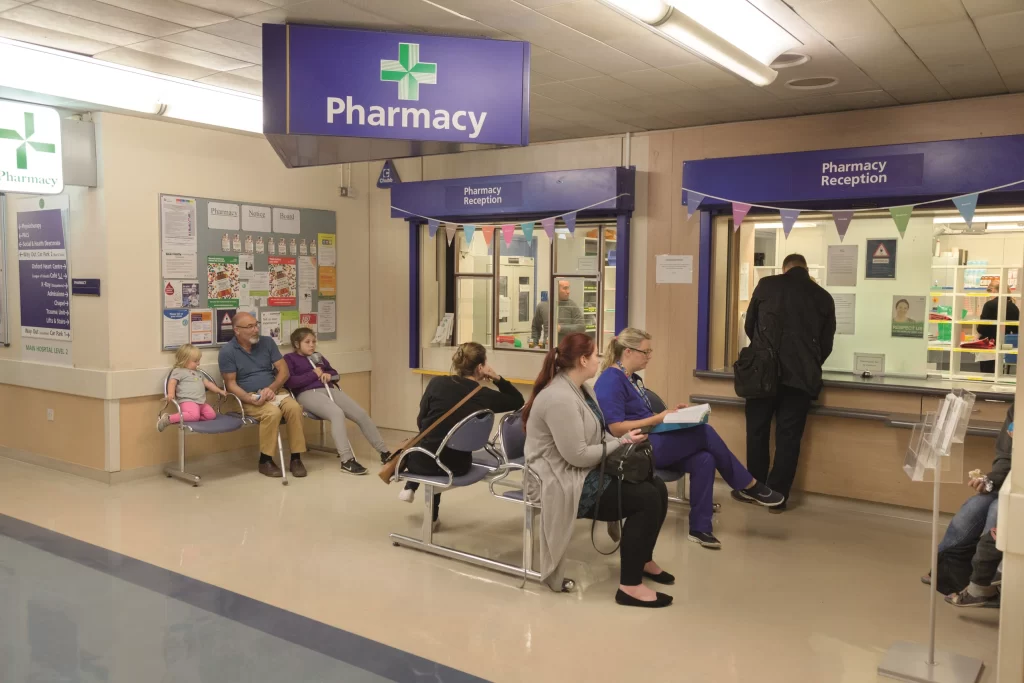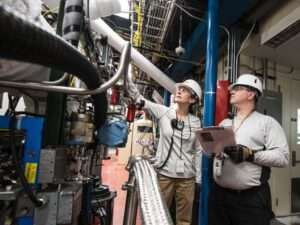Pharmacist Job Description
Pharmacists serve patients by preparing and dispensing medicines. They also provide pharmacological information to multidisciplinary health care teams. They also manage drug therapies, detect therapeutic incompatibility, and ensure the accuracy and safety of medication dispensed to patients. They also ensure pharmacy operations by organizing and directing pharmacy technicians’ workflow, verifying preparation, labeling, and charges.
Also Read – Medical Representative Job Description
Community pharmacists
A community pharmacist is a pharmacist who works in the community, providing care and advice to patients. Their role involves making sure that prescription medicines are safe for people to take, providing advice on lifestyle choices, and assisting patients with their health concerns. Community pharmacists work in a variety of settings, including pharmacies, doctor’s offices, and health clinics.
The job description of a community pharmacist varies according to where the pharmacist is assigned. Some pharmacists work in a hospital setting, and must be able to supervise the pharmacy staff and other medical personnel. They are also responsible for training pharmacy students, interns, and residents. They also have to maintain records of controlled substances and monitor nursing unit inspections. Other responsibilities may include supervising the work of support staff and studying new legislation.
As a pharmacist, you’ll need to understand complex technical information. This requires excellent communication skills, a strong sense of personal ethics, and a lot of patience. Depending on the location, you may need to travel to outlying areas to see customers. You might also need to carry out spot checks, deliver medicines, or set up medical equipment for customers. Community pharmacists will need to complete a four-year accredited pharmacy degree, complete at least one year of pre-registration learning under a mentor, and pass several levels of competency assessments.
A Community pharmacist’s salary varies considerably. The average starting salary for qualified candidates is approximately PS30,000, though this may vary based on the employer and the conditions of employment. For example, independent pharmacies may pay significantly less than a large chain. Experienced pharmacists can earn up to PS50,000 or more. If you have the aptitude and drive to succeed, you can consider moving up to the position of superintendent pharmacist.
Community pharmacists provide general ambulatory care services as well as specialty care. Their main goal is to keep patients healthy. In addition to providing direct patient care, they also strive to enhance the management of community-based pharmacy practices.

Also Read – Clinical Research Associate Job Description
Hospital pharmacists
Hospital pharmacists work with patients and physicians to provide the best possible treatments. Their extensive knowledge of various drugs, the side effects of certain treatments and potential drug interactions make them valuable to the healthcare team. They also provide patients with health advice. While most pharmacists work in hospitals, there are also opportunities for them in nursing homes, health centres and general practitioners’ surgeries.
Their duties in a hospital include ordering pharmaceutical and medical supplies, monitoring therapeutic drugs, counseling patients about appropriate drug use, dispensing medications, and supervising pharmacists and staff. They also participate in hospital-wide governance activities and conduct research into new and innovative medicines. They also serve as a vital source of information for hospital staff.
Hospital pharmacists also perform drug reconciliation and other tasks related to medicines. They help reduce medication errors and hospital readmissions. They also work with multidisciplinary teams to solve problems relating to medicines. They may also compound medicines for patients in cases where they do not have a readily available drug. In this capacity, they can have a significant impact on the quality of patient care.
Hospital pharmacists work closely with the doctors and nurses in their care. Often, they accompany the medical team on patient rounds, answering patient questions, advising doctors on the right medication, and ensuring patients take their prescribed medications. They may also monitor patients’ drug use and report adverse reactions to medications. In addition to managing patient care, hospital pharmacists also oversee pharmacy technicians.
Aside from dispensing drugs, hospital pharmacists also work with chemicals and drugs in a laboratory. After graduating from school, a hospital pharmacist can take up managerial positions in the hospital. They may also pursue further education by taking up a Master’s degree in pharmacy. In addition, they can choose to teach at colleges of pharmacy or pursue research in academia. Some pharmacists even pursue a PhD in pharmacology in order to become a research pharmacist.
Hospital pharmacists are essential members of healthcare teams. They assist physicians by dispensing medicines and other healthcare supplies. Their work is varied, and may include counseling patients, preparing and testing medications, and maintaining all hospital supplies and equipment. They may also be involved in clinical trials and develop protocols.

Also Read – Biotechnologist Job Description
Consultant pharmacists
A consultant pharmacist has a wide range of responsibilities, including ensuring that patients take their medications in the most effective way. They are also responsible for maintaining an emergency tray log and performing routine inspections of the pharmacy and drug storage areas. In addition, they review patient health records and their drug regimens, reporting any irregularities to medical staff. A consultant pharmacist is also responsible for providing 24-hour pharmacy services and in-service training.
Consultant pharmacists have advanced educational qualifications and clinical experience. Their roles often overlap with those of a physician. Some focus on clinical care while others specialize in geriatrics or pediatrics. They may also consult with pharmacists in other locations. They must have a broad understanding of the field and be highly analytical and skilled.
A consultant pharmacist provides expert advice to patients and prescribers about the correct use of medications. They also supervise the administration of medications to ensure that they don’t cause harm. They are typically the senior pharmacist in a given pharmacy, but consult with other pharmacists in different locations to ensure that their patients receive the best possible care. In addition, a consultant pharmacist may specialize in a particular area, such as pharmacy care for seniors or specific illnesses.
Consultant pharmacists are highly sought after by physicians and other healthcare providers. They help doctors make informed decisions about patient medications, and educate physicians and other health care providers about the effects of drugs. In addition, they also help develop and monitor policies and procedures that help ensure the quality of care is optimal. They also work closely with dispensing pharmacies to ensure compliance with regulatory guidelines.
Typically, the majority of patient population for consultant pharmacists are older adults. The profession is not limited to the elderly, however, and includes pharmacists in mental institutions, hospice care facilities, correctional facilities, and acute care hospitals. The majority of patient population in these settings is older adults, making it important for potential candidates to have a comprehensive understanding of geriatrics.

Also Read – Product Development Scientist Job Description
Self-employed pharmacists
The self-employed pharmacist is an option for those who want to run their own business. A pharmacist has several responsibilities and is responsible for the provision of healthcare products and services. These include preparing sterile solutions for use in surgery and emergency rooms, purchasing medical supplies, instructing interns, and conducting research on new medications and drug therapies. They also specialize in radiopharmaceuticals and psychiatric disorders. The role is usually sedentary, and requires long working hours.
The benefits of being a self-employed pharmacist include greater flexibility and the freedom to work for various employers. There is no limit to the number of claims a pharmacist can make. For example, a pharmacist can claim for travel expenses and phone bills. They can even reclaim some of their rent costs. Working as a locum also allows a pharmacist to work in a range of settings, which helps them grow as a pharmacist and build stronger relationships with patients.
Pharmacists can work in GP surgeries or health centres. In these positions, pharmacists advise patients on the appropriate use of medicines. They may also be part of a multidisciplinary healthcare team and interact with patients on a daily basis. Self-employed pharmacists can also set up their own practice and specialize in scientific writing, consulting, or research.
A pharmacist can earn as much as $256,000 per year. Self-employed pharmacists can earn as little as $14,000, but the majority of them earn between $41,500 and $107,000. The highest earners earn around $139,500. There are several opportunities for advancement and increased pay depending on the type of pharmacy practice.
Self-employed pharmacists are an excellent option for those who want to work independently and experience professional independence. Many employers offer well-structured training programmes for new entrants. These programmes aim to provide new pharmacists with a comprehensive overview of the business and a chance to work in different retail environments. Those who decide to work independently are required to maintain their registration and undergo regular continuing professional development.
The majority of pharmacists work in community pharmacies, though some work in large-chain pharmacies as salaried employees. In the latter situation, pharmacists perform managerial duties, including overseeing the day-to-day operations of the pharmacy. Self-employed pharmacists may also work in hospitals or HMOs, where they dispense prescriptions. They also conduct consultations for patients.

Also Read – Animal Nutritionist Job Description
Useful Links:-
Dubai Job Vacancies, Engineering Job Vacancies in Dubai, Top Dubai Jobs, Multiple Dubai Job Vacancies, Dubai Jobs, Jobs in Dubai, Dubai Job vacancies, Dubai Vacancies, Abu Dhabi Job Vacancies, Engineering Job Vacancies in Abu Dhabi, Top Abu Dhabi Jobs, Multiple Abu Dhabi Job Vacancies, Abu Dhabi Jobs, Jobs in Abu Dhabi, Abu Dhabi Job vacancies, UAE Vacancies, UAE Job Vacancies, Engineering Job Vacancies in UAE, Top UAE Jobs, Multiple UAE Job Vacancies, UAE Jobs, Jobs in UAE, UAE Job vacancies, UAE Vacancies
Click Here to find the latest Job Vacancies





























